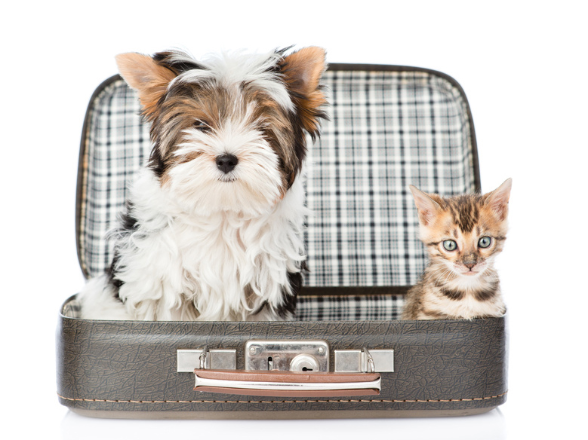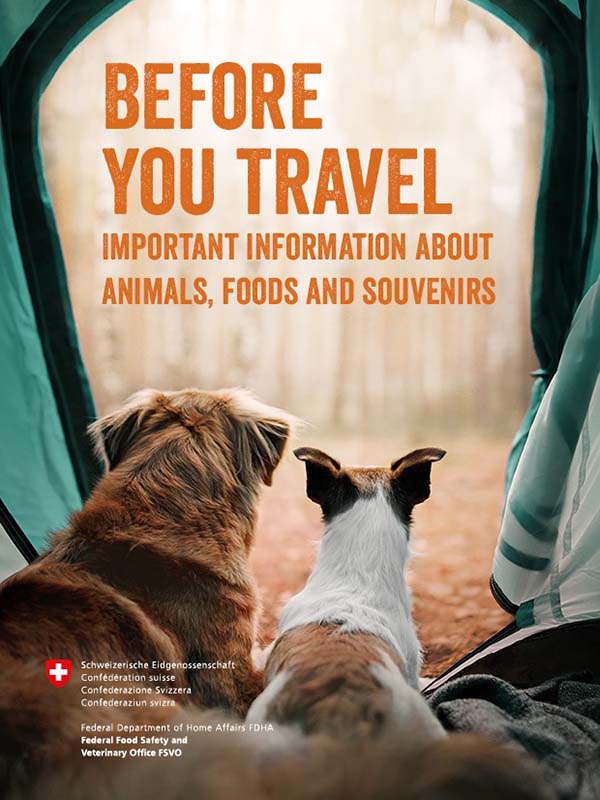Special regulations apply to travel with dogs, cats and ferrets because these pets can be affected by rabies. The purpose of these regulations is to prevent rabies being introduced to Switzerland.
Since there are a great many travel regulations under veterinary law, you are recommended to use the entry check dogs/cats.

The information on these pages is intended solely for individuals with pets who do not intend to sell or give their animals to other people or institutions.
The necessary documents can be found under "More information".
Leaving Switzerland
Before they can travel, dogs, cats and ferrets need at least a pet passport, a microchip and a valid rabies vaccination. The exact requirements are determined by the country to which you are travelling. The conditions for re-entry must be met if you wish to return to Switzerland.
(Re-)entering Switzerland
General provisions
- A maximum of five animals can be brought into the country under the "pet regulations" (see: How is 'pet' defined?). The entry of more than five animals falls under “import for commercial purposes” (see Import).
Exception: You can apply to the FSVO for a licence if you wish to bring more than five dogs, cats or ferrets into Switzerland from a third country (i.e. a country that is not an EU Member State, as well as other European countries and territories with a recognized pet passport) on a temporary basis to take part in competitions or similar events (see "More information"). - It is forbidden to bring dogs with docked ears and/or tails into the country (see "More information").
The current protective measures always apply.
(Re-)entering from the EU
The following is a summary of the regulations that apply when entering Switzerland from the EU with dogs, cats or ferrets.
Young animals up to 12 weeks of age:
- The animal requires a correctly completed official pet passport.
- The animal must be microchipped.
- Young animals under 12 weeks of age do not have to be vaccinated against rabies before they are brought into the country. Animals aged between 12 and 16 weeks old must be vaccinated against rabies. If entry takes place within 21 days after vaccination, the keeper must provide a written declaration confirming that the animals have never come into contact with wild animals of species susceptible to rabies. This confirmation is not required if the young animals are accompanied by their mother and are still dependent on her. Puppies up to the age of eight weeks may only be brought into the country if they are accompanied by their mother.
Animals between 12 and 16 weeks of age:
- The animal requires a correctly completed official pet passport.
- The animal must be microchipped. The implantation of the microchip must take place before the anti-rabies vaccination.
- The animal must have been vaccinated against rabies. The animal must be at least 12 weeks old before it can be given the first vaccination. There is no need for the 21-day waiting period after vaccination if the animals travel with a confirmation completed by the Keeper that they since they were born they have not been in contact with wild animals (see under "More Informations > Forms").
Animals over 16 weeks of age:
- The animal requires a correctly completed official pet passport.
- The animal must have either a tattoo or microchip. A tattoo is only valid if it can be proven that it was done before 3 July 2011. The implantation of the microchip must take place before the anti-rabies vaccination.
- The animal must have been vaccinated against rabies. The animal cannot enter the country until the 21-day waiting period after vaccination has elapsed. If booster vaccinations are done before they are due, the waiting period does not apply.
Exemption permits: If an animal does not comply with all the conditions for entry into Switzerland, a request for exemption (entry application 07/23) may be made. However, exemptions are granted only in justified special cases e.g. for dogs and cats with a veterinary certificate stating that they cannot be vaccinated against rabies for medical reasons (see Art.12, para 4 of the EDAV-Ht).
Entering from a third country
The regulations for entering Switzerland from a third country differ according to the rabies risk in the country you are coming from (cf. list of countries under "More information").
In all cases it is vital for animals first to be marked correctly, then to be vaccinated against rabies and to be accompanied by the documents required in the specific case. More extensive requirements apply if the animal is entering from a country in which there is a risk of rabies (blood test, longer waiting times, import licence, etc.). Before you travel outside the country with an animal from Switzerland, make sure that the conditions for re-entry are fulfilled. You are otherwise likely to be refused entry at the border. The information we provide online under “Crossing the border with dogs, cats or ferrets” lists all the entry requirements and the necessary documents. Please refer to this information in all cases.
Entry is only permitted via the appropriately authorised points of entry and is therefore only possible by direct air transport via Basel, Geneva or Zurich airports.
Entry controls
Pets entering with their owners from third countries must be presented at the red customs exit. Customs checks animals on entry.
If the animal does not comply with the entry conditions, or if the required documentation is incomplete, the animal will be taken to the border veterinary office in the freight area of the airport for further processing.
This processing is only done during the regular opening hours of the respective border veterinary office. Animals arriving outside these times will be taken to the office's animal facility and not inspected until the next working day. The owner will be charged for transport to the animal facility and other expenses.
Entering by aircraft
Accompanied entry: Animals flying in the same aircraft as their owners but not in the passenger cabin must be checked in as “AVI in hold” or “excess baggage”. More information...
Unaccompanied entry: If a pet (dog, cat or ferret) cannot enter the country accompanied by its owner, it may travel as air freight. In this case different formalities apply. More information...
More Information
In detail
Forms
Entering from the EU
Entering from a third country
Swiss pet passports – Information for vets:
In Switzerland, pet passports may only be issued by vets who have a cantonal professional licence or by colleagues employed in such vets’ practices. Before placing your first order, you will have to register once with the Federal Office for Buildings and Logistics by submitting an application form.
Links
Contacts
Last modification 22.10.2025





